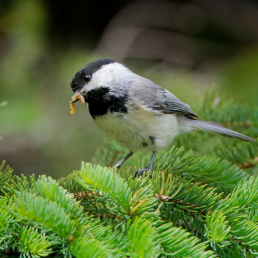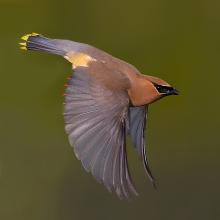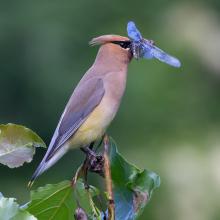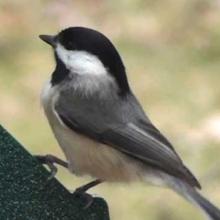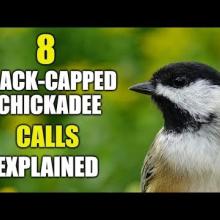

Join BirdNote tomorrow, November 30th!
Illustrator David Sibley and actor H. Jon Benjamin will face off in the bird illustration battle of the century during BirdNote's Year-end Celebration and Auction!
In the depths of winter, when open water is frozen over, it can be challenging for birds to stay hydrated. Some birds eat the frozen water all around them. Cedar Waxwings catch snowflakes in mid-air. Black-capped Chickadees drink from dripping icicles. Plenty of other birds scoop up fresh, powdery snow and eat it. It could be worth the calories to melt the snow when searching for liquid water could expose them to predators.
BirdNote®
Why Birds Eat Snow
Written by Richa Malhotra
This is BirdNote.
[Snowstorm/wind ambi]
In the depths of winter, when sub-zero temperatures last for months and most lakes and ponds are frozen over, how do birds stay hydrated?
Water derived from food alone is not enough, especially since juicy insects are in short supply this time of the year. Instead of flying long distances and losing precious energy in search of liquid water, birds imbibe the frozen water that’s all around them.
While Cedar Waxwings sally to catch snowflakes from mid-air…
[Cedar Waxwing calls, ML 166156861, 0:00-0:03]
....plenty of other birds, including the Red-breasted Nuthatch, White-tailed Ptarmigan, Pileated Woodpecker and Bohemian Waxwing, scoop up fresh, powdery snow from the ground, trees or rooftops. Black-capped Chickadees drink the water dripping from icicles.
[Black-capped Chickadee song, ML 98802, 0:04-0:09]
The Northern Flicker hammers at the icy top layer of snow and eats the tiny shards of ice that chip off.
Eating all that ice comes at a cost. It takes energy to convert ice and snow to water and warm it up to the body temperature of a bird. But it may be worth the calories for, say, a Red-breasted Nuthatch when the alternative is to break off from the flock in search of liquid water, leaving it exposed to predators such as hawks.
[Foraging flock of Red-breasted Nuthatches, XC 211327, 0:10-0:15]
For BirdNote, I’m Michael Stein.
###
Senior Producer: John Kessler
Production Manager: Allison Wilson
Producer: Mark Bramhill
Associate Producer: Ellen Blackstone
Digital Producer: Conor Gearin
Bird sounds provided by The Macaulay Library of Natural Sounds at the Cornell Lab of Ornithology, Ithaca, New York. Cedar Waxwing ML 166156861 recorded by C. McPherson, Black-capped Chickadee ML 98802 recorded by G. Keller, and Red-breasted Nuthatch Xeno Canto 211327 recorded by P. Marvin.
BirdNote’s theme was composed and played by Nancy Rumbel and John Kessler.
© 2021 BirdNote November 2021 / December 2023
Narrator: Michael Stein
ID# drinking-03-2021-11-26 drinking-03
References:
https://doi.org/10.2307/3536522
https://bioone.org/journals/northwestern-naturalist/volume-89/issue-1/1…
